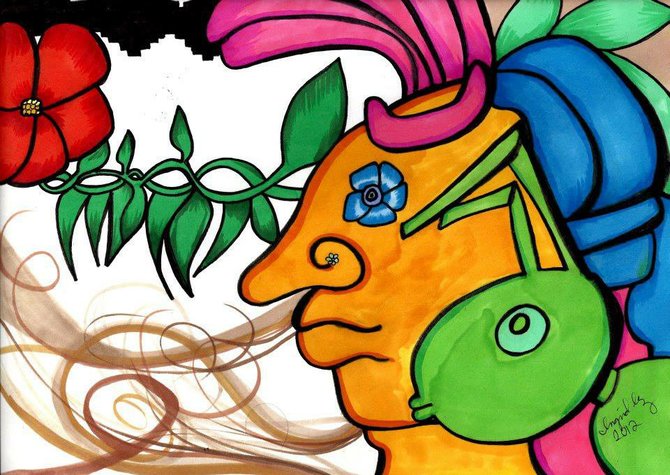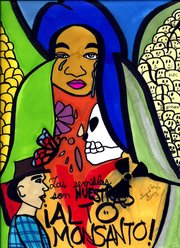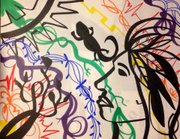Ingrid Cruz finds common ground between her immigration activism and her artwork. Photo by Courtesy Ingrid Cruz
Immigration problems have affected artist Ingrid Cruz and her family. Her stepfather was unable to attend his father's funeral in Aguilares, El Salvador, because he was undocumented. After he got a Green Card in 2001, he was able to return to El Salvador when his mother died. Cruz and her family became U.S. citizens in 2011.
In her artwork, Cruz explores the issues of immigration and deportation. Cruz, who is from El Salvador, also creates art that reflects other issues such as private prisons, women's rights and other world issues. She works tirelessly to organize the immigrant community in Mississippi and advocates for equal and fair human rights. Currently, she is working in Buenos Aires, Argentina, until December.
Cruz, 27, first got involved in activism when she was a student at the Irvine campus of the University of California. After being exposed to campus issues such as the mistreatment of subcontracted workers, Cruz wanted to help. The subcontracted workers, many of whom were undocumented, were receiving no benefits or paid sick days.
"(There was) a lot of stuff going on," she says. "I felt that it was kind of important. I knew that this was happening. I just didn't know how or why."
Her love for art began at a young age.
"Growing up, I would draw a lot, and my mom would encourage me to keep on going," she says. I studied it (in college), and I just kept on doing as much as I could (after graduation)."
Cruz says she likes to draw about subjects that mean something to her, such as human rights. She enjoys being able to make a living out of her passion.
Cruz's involvement in immigration reform and the adversities that the many immigrants among her friends and family faced inspired some of her art.
"I have a lot of friends that have been arrested, and they are trying not to get deported right now," Cruz says. "So a lot of what they go through right now inspires me to make stuff."
One of her most notable works is a piece titled, "Weep Not for Me, But for Our Collective Liberation." It depicts an immigrant mother and her daughter touching hands, the soon-to-be-deported mother behind prison walls. Cruz created this piece to simplify and humanize the issues of deportation.
Another piece, titled "Not1More Deported Mom," Cruz created for the National Day Laborer Organizing Network when the network put out a call for artists on notonemoredeportation.com. The project creates collaboration between businesses, individuals, artists and the like to combat unfair immigration laws. The piece, which Cruz created for Mother's Day this year, depicts a mother holding her child with flowers and barbed wire around them. Its intent was to show the injustice that deported mothers regularly face.
Cruz also creates art about race.
"In Mississippi, black and white communities don't have it together," she says. "Nobody wants to admit the reason why race is such a huge issue here." People tend to forget that white and black people were not the first to be on this land, Cruz says.
"They deny the existence of Native Americans or 'forget' other groups besides black and white exist, and then they wonder why 'we,' who are not represented in this binary, don't participate in these binary discussions on race in the state," she says.
"It's because we don't exist."
To see more of Cruz's artwork, visit ingridisdrawing.blogspot.com.





Comments
Use the comment form below to begin a discussion about this content.
comments powered by Disqus